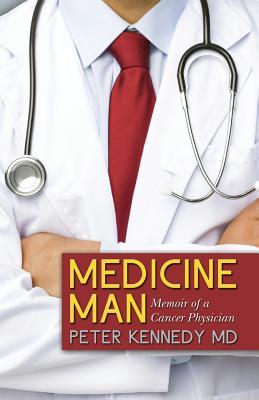Dr. Peter Kennedy, cum laude graduate of Harvard University and graduate with highest honors of Baylor Medical School, was formerly head of the Metropolitan Oncology Medical Group in Los Angeles. Dr. Kennedy describes his journey in medicine in his a medical memoir MEDICINE MAN: The Making of a Cancer Doctor.
Peter Kennedy wasn't expected to live. Born premature with serious kidney defects, he seemed like a lost cause. Yet Kennedy survived, enduring multiple surgeries and going on to become a successful oncologist and medical researcher in the Los Angeles area.
The son of an Irish immigrant and a Jewish mother, both suffering from chemical dependencies, Kennedy grew up sickly in a tough Connecticut neighborhood. His transition to Minnesota athlete, leader, and outdoorsman during high school, and his acceptance at Harvard where he graduated with honors, was nothing less than miraculous. His success in medical school, and subsequent work as an instructor, scientist, medical researcher, and medical oncologist was the fulfillment of the American Dream.
Dr. Kennedy says, "Cancer currently strikes one in two men, and one and three women. It's treated by 'men in white coats' which most people know only as fairly anonymous health providers. Over my career I've come to realize people need to understand that their doctors are people who have known strife, hardship, challenges. That we have different skill sets and varying approaches. Patients and families need to know this. In particular, cancer patients need to realize there's a human behind the white coat who should be their partner in treatment. Through this book readers will see inside the system that trains doctors. They will meet doctors, understand how doctors themselves perceive their patients, and be more able to decide how and by whom they want to be treated. Nothing is more powerful for cancer patients than finding the right partner to provide them treatment, care, and comfort."
Dr. Kennedy describes how incorporating alternative medicine into his practice helped him treat patients more effectively and details how accommodating cultural norms within specific Los Angeles ethnic communities helped him identify and gain early diagnosis for hundreds of cancer patients who might otherwise have gone untreated. He reviews how and why cancer must be treated as a "family illness" and why families and support structures are critical to extending life, and providing optimal quality of life to patients afflicted with cancer.
Dr Cary Presant, Clinical Professor of Medicine at the University of Southern California, Keck School of Medicine, says "Reading this excellent book shows how difficult it is to become a physician and fight disease as well as the medical system. Dr. Kennedy's descriptions of his feelings about his patients are richly worded, and emphasize how important it is for each reader to find a dedicated, compassionate doctor like the author. I recommend it highly." Dr. Presant is also past President of the California Division of the American Cancer Society, and Past President and Chairman of the Board of the Medical Oncology Association of Southern California.
Medicine Man takes readers on a journey through the American medical system and gives them information and insight that may well save their life or the life of someone they love. It is the perfect read for anyone currently undergoing cancer treatment or for anyone who is considering a career in medicine.
